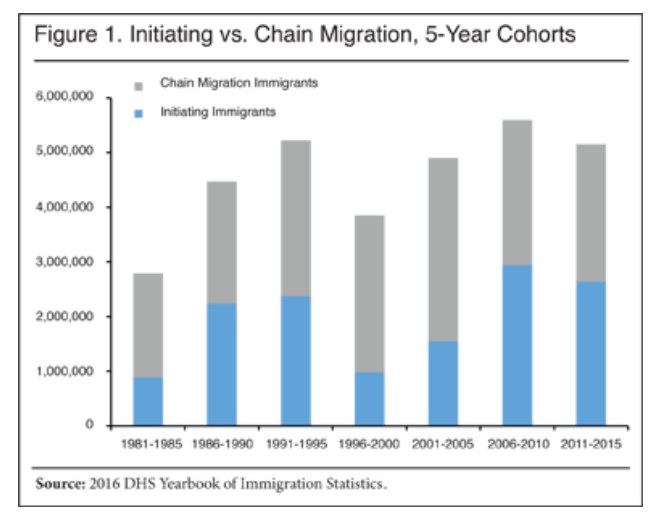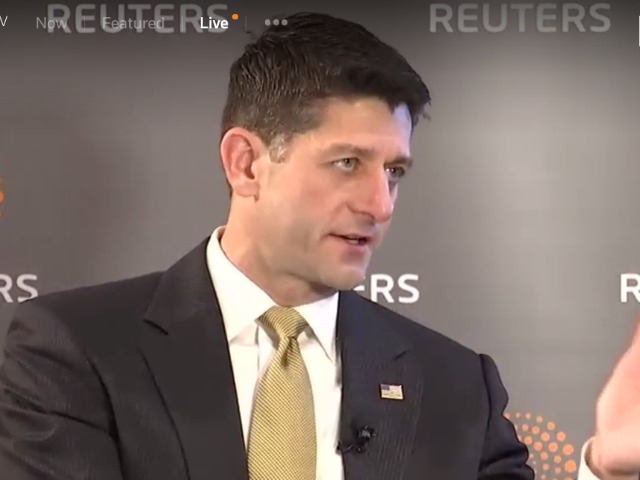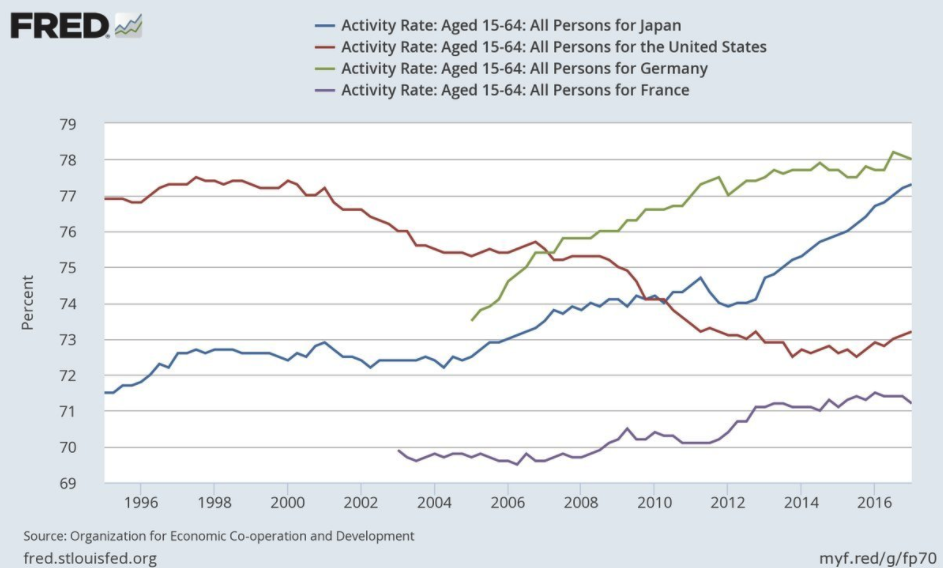Paul Ryan Says He Wants to ‘Fix’ DACA: But Reformers Want Much More
House Speaker Paul Ryan says he wants to “fix” the DACA amnesty problem, but pro-American reformers want him to reach higher and update immigration policy to help Americans.
“We are having lots of discussions about how to do it, and the timing is just something that is open to debate,” he told Reuters in a video interview released Thursday. In response to a vague question about the DACA amnesty and the much bigger Dream Act, Ryan continued:
I want to do it. Yes. The goal is we want to fix this, and we’re working on it, and we want to make sure we do it in such a way that we don’t have the same problem down the road. That means border security and interior enforcement so that we don’t have another DACA problem you know, five, ten years down the road.
But the 690,000 DACA illegals or the 3 million “Dream Act” beneficiaries are only one portion of the nation’s high-immigration, low-productivity economic policy, say pro-American immigration reformers.
Instead of just focusing on the ‘dreamers,’ Republicans — including Ryan — should use the favorable political climate to push for a strategic shift in immigration policy that would help Americans, improve the economy, transfer urban investment into rural districts and grow the Republican Party, say pro-American immigration reformers.
“Getting reasonable [numerical] limits on immigration and ensuring that the people we do admit are net contributors to the country ought to be the primary job not just for Republicans but for anyone making public policy,” said Ira Mehlman, a spokesman for the Federation for American Immigration Reform. GOP leaders “have a great opportunity and they seem anxious to blow it,” he added.
“This is the best correlation of forces that the immigration hawks have ever had, so it is absolutely time to take the initiative,” said Mark Krikorian, director of the Center for Immigration Studies. The goal should be piece-by-piece negotiations which drive down the numbers of arriving workers and migrants, even if the number-reducing deals require some limited amnesties of current illegals, he said, adding “ultimately it is [all about] numbers.”
“This is the first significant opportunity for people who believe in the rule of law to go on the offense and achieve something for the country … rather than stopping another amnesty,” said Kris Kobach, the Kansas Secretary of State. He continued, saying that the GOP leaders:
who are working hand-in-glove with the Chamber of Commerce on amnesty are missing the bigger strategic considerations … they are staring at the trees, missing the forest all around them. They’re doing damage to the country, alienating the blue-collar voters who went overwhelmingly for Trump and [who] should be invited into a Republican Party that defends the American worker.
Trump’s pro-American stance allows Americans to focus on their goal of reducing numbers, instead of the amnesty threat, said Roy Beck, founder of the appropriately named advocacy groups, NumbersUSA.
CIS: Total Immigrant Population Hits Record High of 43.7 Million in 2016 https://t.co/RX6Q9t3FQi pic.twitter.com/LO1ubh6jAY
— NumbersUSA (@NumbersUSA) October 18, 2017
Trump’s popular and ambitious immigration principles, released October 8, says Americans need safeguards — including a large reduction in immigration numbers — before any legalization can be offered to help migrants. Numerous polls show Trump’s two-track proposals are far more popular than the Democrats’ business-backed, pro-migrant, anti-American rhetoric.
Democrats and business leaders have tried to distract the media from Trump’s popular, productivity-boosting, election-winning immigration policy by getting the media to focus on the smaller issue of several hundred thousand young illegals, so the so-called “Dreamers.” That has been an easy task, ensuring a steady river of fake news from media outlets about the cost, reality, and politics of immigration.
On October 11, for example, the Democrats’ leader in the House, Rep. Nancy Pelosi described mass immigration as a “fundamental” part of the United States, and suggested that ‘dreamer’ illegals have a veto over the nation’s policies and Trump’s immigration principles:
They aren’t principles, they are trash – are unacceptable to the DREAMers and those of us who fight for them, opposed by the overwhelming majority of Americans and anathema to our national values. Together, these brutal proposals – each one of them is horrible – but the cumulative effect of them would destroy a fundamental part of the American character: a free nation proud of its immigrant heritage.
The Democrats’ business allies — who value immigrants as consumers and as cheap workers — also want to shift the debate away from numbers and from Trump’s principles.
In September, Tim Cook, the CEO of Apple, insisted the DACA amnesty is “the biggest issue of our time,” that Americans are inhuman for not supporting a no-strings amnesty, that DACA illegals are better Americans than Americans, and each illegal is as useful to the economy as billionaire Mike Bloomberg:
This is the biggest issue of our time because this goes to the values of being American. This is ‘Are we human’? ‘Are we acting in a track of morality?’ right? These people … At Apple we have many … they love America deeply. When you talk to them, I wish everyone in America loved American this much. They have jobs, they pay taxes, they are pillars of their community, They’re incredible people, and so, to me, it would be like someone coming to Mike [Bloomberg] and saying ‘Mike, I just found out you aren’t really a citizen here, you need to leave.’ This is unacceptable. This is not who we are as a country, and so I am personally shocked that there is even a discussion of this.
But then Cook dropped the schmaltz and unveiled his larger goal of turning Americans’ raucous society into a billionaires’ tranquil cubicle-farm:
On the broad subject of immigration, if I were a country leader right now, my goal would be to monopolize the world’s talent. I’d want every smart person coming to my country because smart people create jobs and jobs is the ultimate, ultimate thing that creates a great environment in a country … it gives people a sense of purpose.
This hostility towards Americans’ civic society is political suicide for Democrats, says a variety of polls and says a growing number of left-leaning activists.
“Democrats in 2017, in general, tend to criticize the use of immigration enforcement and tend to side with those accused of violating immigration law, as a broad matter of principle … This is, to be blunt, political suicide,” said Andrew Sullivan, the immigrant British-born author who championed the same-sex movement, in New York Magazine.
Even the New York Times has recognized the Democrats’ vulnerability: “The pressure from some immigrant activists to reject any compromise that would tighten border security has frustrated Democratic leaders, who recognize the political risks of being labeled the party of open borders — a potentially lethal tag as they seek to regain support from working-class voters across the Midwest.”
Democrats and business groups, however, continue to bluff their way through the polls. They are bluffing the credulous media despite the nine-seat electoral disaster Senate Democrats suffered after Sen. Chuck Schumer personally led the “Gang of Eight” amnesty-and-cheap-labor bill in 2013 and 2014. On October 22, for example, Schumer declared on Meet The Press:
Well, I I would hope that we can get DACA done before the end of the year. Um, there’s overwhelming support in the House and Senate, once again, to deal with these kids. Even the president has expressed sympathy. And I think in this case, it’s genuine for the DACA kids. What happened here, same thing on health care. We came to an agreement, the right wing attacked, and he backed off. He cannot let a fringe wing of the Republican Party run the show, or his presidency will not accomplish anything. And that’s the greatest rap against him, even with his supporters. So what he ought to do is follow through on the agreement he had with Leader Pelosi and I. If not, we will figure out a way to get this done before the end of the year. We think it’s really important.
In contrast to the Democrats and the GOP leaders on the Hill, administration officials are already hinting that they are aiming for a big victory, not just a defeat of the latest amnesty demanded by business-first lobbies and migrant-first Democrats.
On October 18, for example, Attorney General Jeff Sessions told a Senate hearing:
I would just note the president has said he wants to work with Congress. He has a heart for young people, but we have got to have more than just an amnesty, friends. We need a good improvement in the illegality that’s going on, and there is an opportunity right now, I’m telling you — an opportunity now to do something historic.
“I am prepared to say, and I think I’ve said previously, something could be worked out on this. But it can’t just be one-sided,” Sessions told pro-amnesty GOP Sen. Lindsey Graham at the hearing. “President [Trump] has set out a reasonable and effective plan with numerous immigration priorities for this body to consider, including a border wall, significant asylum reform, swift border returns and enhanced interior enforcement.”
So what are the historic goals of taking the initiative?
Trump’s popular principles offer a good set of guidelines, say reformers. In his October 8 letter to Congress, Trump declared:
I have enclosed the detailed findings of this effort. These findings outline reforms that must be included as part of any legislation addressing the status of Deferred Action for Childhood Arrivals (DACA) recipients. Without these reforms, illegal immigration and chain migration, which severely and unfairly burden American workers and taxpayers, will continue without end.
Immigration reform must create more jobs, higher wages, and greater security for Americans — now and for future generations. The reforms outlined in the enclosure are necessary to ensure prosperity, opportunity, and safety for every member of our national family.
The benefits of any deal must be large to overcome the damage of signing another amnesty said Kobach. “Amnesty is a bad public policy … no matter what is connected with [because] any amnesty will result in a new surge” of migrants towards the Texas border, he said.
That disaster was demonstrated in California, where the federal 1986 amnesty spurred a huge wave of illegal immigration and chain-migration from Mexico. Twenty years later, the state is dominated by a combination of far-left unions and extreme progressive elites, amid huge gaps between rich and poor, educated and uneducated and a huge number of people who can’t speak English.
According to Kobach,
It would take quite a lot to justify the negative consequences of an amnesty: At a minimum, there would have to be nationwide E-Verify, plus something like the RAISE Act, plus funding for the wall, plus additional measures to preserve the rule of law … at a minimum, all of those things.
At this point, it does not look that kind of deal is on the table … [so] I can’t see any [pending deal] that would justify an amnesty.
“Going on the offensive is the thing to do, but [the goal] has to be more than [offsetting cuts in] chain migration,” said Krikorian, director of the Center for Immigration Studies.
Reformers say they needed to get strategic fixes for several problems:
Chain-migration is a huge issue for reformers because it more than doubles the annual inflow of 1 million immigrants. It ensures that each new migrant can bring in an endless supply of their relatives, including elderly parents, uneducated siblings with their children, and all of their home-nation politics. If not fixed, chain migration would convert any DACA “fix” by Ryan for roughly three million younger illegals into a huge wave of perhaps 10 million lower-skilled Mexican migrants over the next 20 years — many of whom will vote Democratic in Texas.
The chain-migration problem would be reduced by the pending RAISE Act, which is backed by Trump, Georgia Sen. David Perdue and Arkansas Sen. Tom Cotton. A similar version has been introduced in the House by Texas Rep. Lamar Smith. Both would trim chain-migration by roughly 45 percent, cutting annual immigration by roughly 400,000 relatives of recent immigrants.
Any reduction in immigration numbers is good for Americans because it would pressures investors to develop new labor-saving machinery — such as robotic cow-milking devices — and also to hire Americans now stuck in dying interior towns.
Cutbacks in immigration would also pressure employers to recruit and train the record level of sidelined workers, and also to raise Americans’ wages after decades of minimal wage growth, likely boosting American work rates, marriages, births and GOP ballot-box numbers.
Each year, 4 million young Americans join the workforce, but immigration adds roughly 1 million new workers – or one extra worker for every four new American employees.
E-Verify is the name given to a federal database where employers can check the bona fides of job applicants. The current system is voluntary, and reformers say it should be mandatory so that employers can’t hire illegals with fake Social Security Numbers. If mandatory, it could sharply cut traditional illegal immigration by migrants who cross the Texas border, and also reduce the hundreds of thousands of legal visitors who overstay their visas.
Lamar Smith also has an updated E-Verify bill, which also requires officials to tell Americans when their Social Security Numbers are being used by illegals. The bill was approved October 25 by the House judiciary committee, allowing Ryan to schedule a floor vote by the House. It was passed with support from the influential agriculture industry, which got in exchange a new visa-worker program to provide them with roughly 1 million very cheap H-2C guest workers.
The border wall: The House and Senate appropriations committee has allocated $1.6 billion as a downpayment on the border wall in 2018. Democrats strongly oppose the wall, which is both a practical barrier to illegal migration into the Democratic-dominated cheap-labor cities, and also a symbolic rebuke to the progressives’ claim that Americans do not have their own country, but are simply participants in an “American idea” which anyone in the world can join, by legal or illegal immigration.
“Until the border is secure, any agreement on [legal immigration] numbers of is 100 percent meaningless,” Rep. Louie Gohmert told Breitbart News October 25. ” I cannot emphasize that enough …. [but] once the border is secure, the numbers will matter.”
Interior security improvements are needed to help deport illegals, including those protected by Democratic-run sanctuary cities. Many of the needed improvements are included in the Davis-Oliver Act, approved in May by the House judiciary committee. So far, the GOP leadership in the House has only allowed two small portions of the act to be passed by the full House.
Also, Trump’s principles also call for legal changes to end the “catch and release” policies required by the rising tide of asylum claims at the Texas border.
For the moment, Ryan’s apparent willingness to go for a DACA “fix,” not a pro-American strategic shift, means that reformers must spend a lot of time blocking various unpopular amnesty proposals in the House and Senate.
For example, the Associated Press cited GOP opposition to reports that Ryan would put DACA-related legislation in the December budget bill:
Rep. Jim Jordan, R-Ohio, a former chairman of the group, said “we’re nervous about the talk of putting it on the big spending bill in December.”
“I think we’ve got to construct the border security wall. We got to stop money going to sanctuary cities. I think it has to be that bold. … And I think that needs to happen first, quite frankly,” Jordan said.
Reformers have stopped many prior amnesty bills, largely because the public overwhelmingly opposes cheap-labor migration, no-strings amnesties, and favoritism towards migrants. Even before 2016, Ryan saw this public pressure up close and personal in June 2014, when GOP primary voters defenestrate his friend and colleague, Majority Leader Rep. Eric Cantor.





Comments are closed.